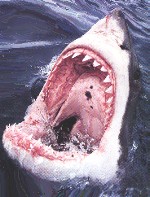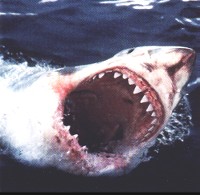

Only the underneath of the great white shark is actually white; its top surface is grey. This is useful in hunting its prey. The great white usually strikes from below, and its greyish top colour blends in with the dark water, enabling it to approach its prey unobserved.  Great whites have up to 3000 teeth, which are razor-sharp and up to 7 cm long. But they don't chew their food. Their teeth rip prey into mouth-sized pieces, which are swallowed whole. As teeth are lost, broken, or worn down, they are replaced by new teeth that rotate into place. A big meal can satisfy a great white for up to 2 months. Great whites have up to 3000 teeth, which are razor-sharp and up to 7 cm long. But they don't chew their food. Their teeth rip prey into mouth-sized pieces, which are swallowed whole. As teeth are lost, broken, or worn down, they are replaced by new teeth that rotate into place. A big meal can satisfy a great white for up to 2 months. A shark breathes through its gills. The great white shark uses its nostrils to smell its prey; it is very sensitive to blood. It also has organs in its skin which can sense magnetic fields, enabling it to detect the muscle movements of its prey as well. Apparently the great white is the only shark which will rise to the surface and poke its head out of the water, perhaps to look for seals or other potential meals.  Like all sharks, they swim all the time, or they will sink, since they are heavier than water; they have no swim bladder to help them float like other fish do. Also like other sharks, they can't swim backwards or come to a quick stop, because their fins aren't flexible like other fish. Like all sharks, they swim all the time, or they will sink, since they are heavier than water; they have no swim bladder to help them float like other fish do. Also like other sharks, they can't swim backwards or come to a quick stop, because their fins aren't flexible like other fish. Sharks give birth to live babies, called pups, usually from 2 to 10 at a time. A great white shark pup can be up to a metre and a half long when born. Babies are on their own when they're born ... the mother swims away. No-one knows the life-span of a great white shark. There are estimates that it may be up to 100 years, but it's not known for sure. These sharks are slowly disappearing from the oceans, and may in danger of becoming extinct; in some places, they are a protected species. This shark has a predator. The Killer Whale will attack the sharks, taking bites out of them to eat their livers, and discarding the rest! |